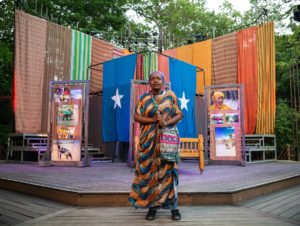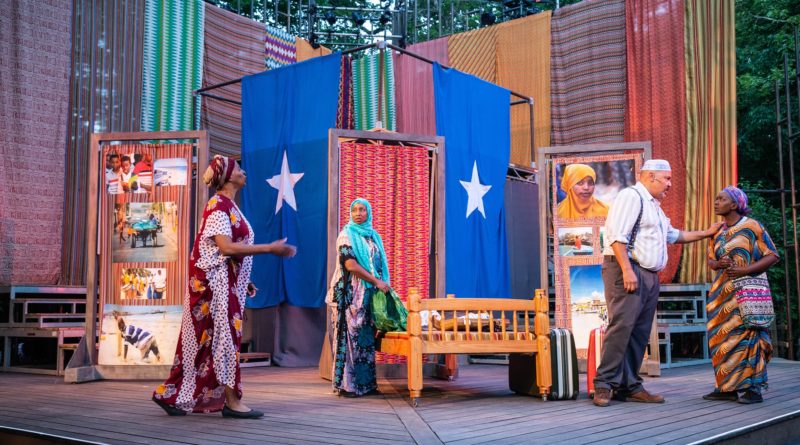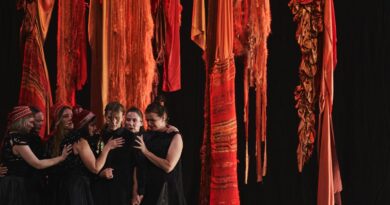Actor-storyteller Germaine Konji discusses decentering the classic American musical in new hit “Dixon Road”

Fatuma Adar’s debut musical Dixon Road is not just a welcome addition to the musical-theatre canon – it’s a runaway success by several measures.
For starters, the musical is authentic, original, and represents a vibrant community whose stories North American audiences need and want to hear. It’s based on the lived experience of Adar’s family, who emigrated to Canada from Somalia and built community in the Dixon Road area in Toronto’s west end near Pearson Airport, where many Somali immigrants have settled. The neighbourhood has become known within Somali communities worldwide. Over the years, Adar’s father became a central figure in building the strong community that still exists today.
Second – since its opening at The High Park Amphitheatre, Dixon Road has earned raves from critics and audiences. The musical’s book, score and lyrics are all composed by Adar. And this outdoor production of Dixon Road is a co-production by the Musical Stage Company and Obsidian Theatre Company, in Association with Canadian Stage. It has officially launched Canadian Stage’s always-anticipated Dream in High Park season with a resounding bang.
Third – the current production of Dixon Road, which runs until June 19, celebrates the rich and vibrant culture of Somalia. Every performance of Dixon Road includes pre-show participatory experiences that offer audiences the opportunity to learn about and immerse themselves in Somali heritage through music, dance, and art and craft. Members of the artistic team of Dixon Road also present pre-show chats before every performance.
Directed and choreographed by Musical Stage Company Artistic Director Ray Hogg, an outstanding cast brings to life this story of a Somali family who immigrate to Canada in 1991 as the civil war begins to tear apart their homeland. Featured performers include Germaine Konji is Batoul, Starr Domingue as Safiya, Aadin Church as Zaki, Michael Clarke as Abdi, Danté Prince as Yousef, and Shakura S’Aida as Hakima. Rounding out the cast are Michael-Lamont Lytle, Rose-Mary Harbans, Travae Williams, and Krystle Chance.

Germaine Konji has been earning raves for her role of Batoul. After graduating from the Sheridan Music Theatre Performance program in 2020, Konji has accomplished in two years what takes many emerging artists a decade. Shortly after her graduation, she won the Banks Prize with the Musical Stage Company. Last fall, she played Little Red/Rapunzel in Talk is Free Theatre’s Into the Woods. She has appeared in several productions with Musical Stage Company, including as Sarah in Blackout during last summer’s Dream in High Park. Recently, Konji made her Stratford debut performing in a cabaret alongside veteran actors Sara Farb and Steve Ross. She was also a part of Tarragon Theatre’s much-lauded production of Orphan Song. And after Dixon Road, she will head straight to the Blyth Festival to play the role of Mildred Ware in John Ware Reimagined.
Most impressive, of course, is that she accomplished all of this during a global pandemic: a time of unsteady pause that made it hard for artists to work – let alone flourish. And this trajectory of success could not be happening to a more deserving artist. Not only is Konji talented, with an expressive voice and an arresting stage presence, but she is warm, thoughtful and expressive about all aspects of her art. Recently, she took time out to chat with SesayArts Magazine about Dixon Road and premiering the role of Batoul.
SM: Let’s start with you. Tell us about you and what led you to a career in the arts, especially theatre.
GK: My name’s Germaine Konji. I’m an actor, singer, writer, messy eater and a whole lot of other things – mostly, I call myself a storyteller. Being Kenyan, I grew up in a home filled with song and dance where expression was a way of being- not simply an act of doing. I come from a long line of captivating orators who united communities with their tales, so naturally, I chose theatre.
SM: Dixon Road is an important and exciting addition to the global canon of musical theatre. How did you come to this project? Is there a personal connection for you?
GK: Last year, I was a performance apprentice with Musical Stage Company through their Banks Prize program. I heard about the premise of the show, and said “I want in”, especially given my personal connections to the piece. Although my family and I came from Kenya as immigrants, I know what it’s like first hand to grapple with starting over in a foreign place for reasons outside of your control. I know what it’s like to watch your parents have to assimilate in order to be given a chance- all while maintaining a deep pride in who they are and where they come from. I know what it’s like to be the child of newcomers, trying to find yourself while proving their sacrifice worth it every single day.
SM: Speak to us about your character Batoul and what attracted you to the character. What’s your approach to playing her?
GK: And that’s exactly what attracted me to Batoul. Just like her, pursuing the arts was a tough decision to come to – one that caused much conflict and division in the home before eventual acceptance. But even so, she keeps dreaming just the same, with an optimism that frees not only her, but her community as well.
SM: What’s been the biggest surprise to come out of working on Dixon Road? Were there any challenges?

GK: Biggest challenge I think was this being the first full musical back for many of us on the Dixon Road team since the pandemic. Musicals are a HUGE undertaking! More specifically, after the collective racial reckoning we had, one of the biggest challenges is establishing new practices. We (especially as an all Black cast) are aware of the many ways that the White Supremacist values that run our industry are harmful and baseline exploitative. Now what’s next is to figure out if not that…then what? We know what doesn’t work, but what does?
SM: I read with interest that your research focuses on “investigating the decolonizing, and decentering of the American musical”. I read that you’ve continued your studies on the “institutionalization of diversity and the maintenance of a dominant culture as they interact with music theatre performance and artistic practice”. This focus is not only interesting but also critical, as the news makes abundantly clear. Would you like to speak a little about this? Might Dixon Road be a work of musical theatre that might counter or subvert the dominant culture of musical theatre, in your opinion?
GK: By its very definition, music theatre is a decolonial act. Combining art forms otherwise segregated in the western tradition to tell one story, it is one of the oldest most universal forms of storytelling. How many cultures sing to their young, or break bread around a tale?
However, when I was introduced to music theatre, it became clear that outside of oppression, there was no space for recognizing the true contributions of Blackness in the popularized history of this form – but that doesn’t mean the contributions weren’t many, and of great importance.
So my question became, “how does a dominant culture maintain its power?”. One of the answers is, by controlling mass perception through the calculated manipulation of narrative. Most shows where we have representation of the African diaspora within the American Music theatre cannon are exonyms – written about us, not by us and certainly not for us, with names for ourselves that do not fit in our mouths. For this reason, Dixon Road is a decentering of the classic American musical, and a centering of the groups that it speaks about. It is the beginning of us collectively reckoning with the following; who do we of the global majority say that we are? And who is the colonizer now without their pen?
Fast Five with Germaine Konji
1. If you could give some advice to your teenage self, what would you tell her?

Don’t take yourself so seriously!!
2. What song or music got you through the pandemic?
Nina Simone’s Wild is the Wind album.
3. What’s something you can’t live without?
Tenderness
4. What’s a pleasant surprise you’ve had recently?
I asked for 2 chocolate timbits, but they gave me 5!
5. Tell us something about you that might surprise us.
I’m ambidextrous.
Reserve tickets for Dixon Road here.
© Arpita Ghosal, SesayArts Magazine, 2022
About The Author
Arpita Ghosal
Arpita Ghosal is a Toronto-based arts writer. She founded Sesaya in 2004 and SesayArts Magazine in 2012.
Visit About Us > Meet the Team to read Arpita’s full bio …


